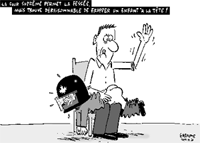
From the beginning of the 1950’s to this day, UNESCO has initiated a succession of actions to promote education founded on principles of education for peace, non-violence and tolerance. The culture of peace promoted by the organisation today takes its place in an historical continuity, even drawing on the foundations that led to its birth in 1945.
In its Declaration and Action Programme on a culture of peace (1999) , UNESCO calls for all children to receive an education in values, attitudes, behaviour and ways of life that allows them to resolve disputes peacefully and in a spirit of respect for human dignity, tolerance and non-discrimination. More
 The Judges of the Canadian Supreme Court have accepted to look into the validity of a law article allowing the use of corporal punishment on children.
The Judges of the Canadian Supreme Court have accepted to look into the validity of a law article allowing the use of corporal punishment on children.
Article 43 of the Criminal Code of Canada provides that a parent, teacher or person acting in the place of a parent is justified in using force on a child, provided that the force used doesn’t exceed the reason in all of the circumstances. 110 years old, «this clause was originally based on the right to beat prisoners, employees as well as the spouse (as far as the latter be, of course [sic], of female sex) and the childen», Alain-Robert Nadeau, attorney and doctor in constitutional law, tells us. More
Putting forward research on students and assaults in the Netherlands, Ton Mooij (1989) examined the environmental variables of anti-social behaviour. Amongst them, we noted:
